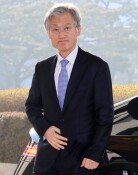Will South Korea and the U.S. Negotiate Their Different Views on North Korea?
Will South Korea and the U.S. Negotiate Their Different Views on North Korea?
Posted May. 07, 2001 09:29,
As it is reported that the U.S. examination of the North Korea policy is in its final stage, the government officials are looking forward to the visits of Deputy Secretary of State, Richard Armitage, and Assistant Secretary of State for East Asian and Pacific Affairs (EAPA), James Kelly, to South Korea on May 9.
Their visit to South Korea implies that the U.S. hard-line stance on North Korea is softened. This speculation is based on the well-known fact that Deputy Secretary of State Richard Armitage is known as a soft-line within the State Deputy. Assistant Secretary of State for EAPA James Kelly also said that The U.S policy on North Korea will lean toward the direction to maintain the North Korea- U.S. Geneva agreement.
The supportive stance on South-North reconciliation taken by Swedish Prime Minister Goran Perrson and the EU delegation, who visited both South and North Korea, will also influence the visit of Deputy Secretary Armitage and James Kelly. The current situation of Korean peninsula is a step toward the right direction.
The ostensible purpose of Deputy Secretary Armitage and Kelly’s visit is to explain the U.S. stance on U.S. President Bush’s MD plan. Since they hold power on the Korean peninsula policy, it is expected that the South Korea and U.S. will eventually negotiate in regard to the North Korea policy.
On May 7, a government official said, The fact that they will meet with both President Kim Dae-Jung and the foreign-security team indicates that our position will be recognized by the U.S. Especially, we will deliver the message that North Korea and the U.S. should engage in dialogue once the U.S. examination of North Korea policy is completed.
The government believes that the Bush administration’s rigorous examination of North Korea policy can be discussed once the North Korea-U.S. dialogue takes place.
It is especially curious as to how Deputy Secretary Armitage and Kelly will respond to the National Defense Commission Chairman Kim Jong-Il’s comment to Swedish Prime Minister Perrson about the issues of missile moratorium and continuation of missile exports. A government official predicted that The U.S. also responded positively to the North Korea’s decision on missile moratorium and this will affect to the Bush administration’s North Korea policy.
However, the case of Kim Jong-nam’s illegal entry to Japan and deportation may influence negatively on the U.S. examination of North Korea policy.
Kim Young-Sik spear@donga.com




![[천광암 칼럼]장동혁은 대체 왜 이럴까](https://dimg.donga.com/c/138/175/90/1/wps/NEWS/IMAGE/2026/02/22/133399127.1.jpg)


